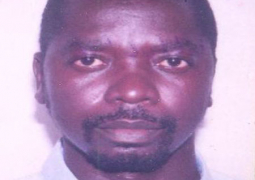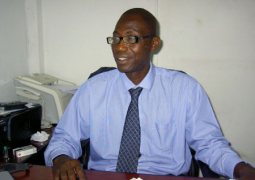The Peresident of Austria Heinz Fischer last Tuesday 12th September hosted 60 World Press Freedom Heroes of the International Press Institute to a dinner as part of the IPI’s 60th anniversary.
Among them was Pap Saine, Co-publisher and Managing Editor of the Point Newspaper who was in Vienna, Austria to receive an award from the IPI as one of its World Press Freedom Heroes.
Below we reproduce the full text of President heniz’s statement at the dinner:
Ladies and Gentlemen,
It is with great pleasure that I welcome all of you here at the "Redoutensaal" of the Vienna Hofburg, a hall steeped in history, to the World Congress of the International Press Institute (IPI), which will take place from 11 to 14 September in both Vienna and Bratislava.
I would like to extend my heartfelt congratulations to the International Press Institute, which is celebrating its 60th anniversary here at this Congress.
This leading global organization dedicated to the promotion and protection of press freedom was founded in October 1950 at Columbia University in New York. Its emergence was midwived by 34 renowned editors from 15 countries.
Today, 60 years later, the IPI comprises about 2,000 members from 120 countries. One could even refer to this leading media organization as a "United Nations of the World of the Media."
Austria and the City of Vienna have a special connection with the International Press Institute, as the IPI has been headquartered here since 1992. Furthermore, it was led by the Austrian Johann Fritz for 15 years from 1992 to 2007, who, in his capacity as Director, also spurred new ideas in this organization with its worldwide operations in the media field.
Personally, I fondly remember my participation in the IPI Congress here in Vienna in 2002, when I was invited as the then President of the Austrian National Council to give a talk on "Parliamentarianism and Freedom of the Press".
Ladies and Gentlemen,
This year's Congress, marking the IPI's 60th anniversary, focuses on the "state of the media", and specifically on "Thinking the Unthinkable: Are We Losing the News?."
It will examine new challenges in the media landscape, such as how to ensure the survival of traditional media and manage co-existence with new media.
Nonetheless, the goals of the IPI members, which include prestigious media such as BBC, CNN, Deutsche Welle, The New York Times, The Boston Globe, The Guardian, Neue Zürcher Zeitung, Ha'aretz from Israel, Asahi Shinbun from Japan and others, have remained the same as they were 60 years ago: the furtherance and safeguarding of press freedom, the protection of freedom of opinion, free access to information, and the improvement of the practices of journalism.
Furthermore, 60 years after the IPI's founding, in the first decade of the 21st century, press freedom is a global concern that still needs to be fought for day by day in many countries.
Article 19 of the United Nation's Universal Declaration on Human Rights stipulates the right to freedom of expression and emphasizes that this right includes freedom to seek, receive and impart information and ideas through any media and regardless of frontiers.
Furthermore, this fundamental right is granted by numerous other international instruments and national laws and regulations. Practical experience, however, shows that freedom of expression and press freedom are threatened time and again. The IPI's "Death Watch" illustrates just how dramatic is the extent of this threat: in 2009, 110 journalists lost their lives while carrying out their profession. Thus far in 2010, this death toll already encompasses some 52 journalists.
This sad state of affairs demonstrates the IPI's importance as an organization that fights any restrictions to press freedom and strives to protect journalists against violations as they carry out their profession with all its responsibility.
Ladies and Gentlemen,
In Austria, the call for press freedom was heard loud and clear as far back as the civil revolution of 1848. Consequently, the "Reichstag" elected in 1848 elaborated a draft of fundamental rights which granted particular importance to the freedom of opinion and of the press.
Today’s press freedom as enshrined in the Austrian Constitution effectively goes back to the year 1867: Article 13 of the "Staatsgrundgesetz", the Fundamental Laws governing the general rights of the citizens, guarantees freedom of expression. The legal provision for this fundamental right is still effective today. Since 1867, the guarantee of the freedom of expression as a basic right anchored in Austria’s Fundamental Laws has been given further depth, yet at times was also spurned.
Most flagrantly so in the gruesome period from 1938 to 1945.
Yet, the imperative of guaranteeing freedom of the media and of opinion as is the case in a democratic constitutional state such as Austria espouses the commitment to prevent any abuse of this freedom.
For it can be well that conflicting priorities may arise between the freedom of expression or of the media and other legally protected rights equally guaranteed by the Fundamental Laws, such as the presumption of innocence enshrined in the European Convention on Human Rights, which has to apply to anyone charged with a criminal offence. The respect of privacy and the "protection of the reputation or the rights of others" (Article 10, paragraph 2 of the European Convention on Human Rights) also set limits to absolute press freedom.
In this context, it is to be noted that guaranteeing freedom of opinion and of the media as well as protecting privacy and personal rights constitute two of the most central pillars of a democratic constitutional state.
Time and again, the daily work of journalists and media relations officers reflects these conflicting priorities. Here, it is the role of laws to adequately align interests in the areas of civil, criminal and media law, and to balance the freedom of the media and the protection of privacy.
This requires sensitivity and sound judgement and is certainly not always an easy task.
Ladies and Gentlemen,
Allow me to explore one more thought connected to your overall topic of the "status of the media". New communication and media technologies are evolving at an ever growing pace.
Just as Gutenberg's invention of the printing press changed the world, so nowadays do mobile phones, the internet, Facebook, Google, and Wikipedia, whose usage has become a given, especially for younger generations. We are heading for the "transparent individual" and should take seriously concerns regarding privacy and data protection, as well as the resulting impact on the media field.
From my point of view, following a political debate, we will need international rules and regulations concerning the rapid technological evolution of the digital world. Increasingly, we are faced with the question of the actual meaning of "privacy" under digital conditions - I call to mind "Google und Street View".
An open and democratic society must reflect on how to set limits for the "digital public" to ensure the protection of the individual. In the media context, we also face the question as to whether or not online media threaten the print edition of newspapers and magazines and increasingly deprive them of their economic resources, and how the "paper/print only" business model can survive. All these are fascinating questions that will surely play a role on the agenda of the IPI Congress.
Ladies and Gentlemen!
This year's IPI World Congress, marking its 60th anniversary, takes place in the "twin cities" of Vienna and Bratislava. These cities have close ties both historically and culturally, yet over many years existed side by side in a divided Europe. 45 minutes away from Vienna, the Iron Curtain appeared to be an insurmountable barrier.
21 years ago, this barrier was torn down, and today our borders are open. Both Austria and Slovakia are members of the European Union. The freedom of opinion and of the press is enshrined in the Constitutions of both countries and has greatly progressed in other countries of the former Eastern Bloc as well. It is our big task to fill our Constitutions with life and keep them alive.
I wish your Congress and your discussions much success and hope that you will take home with you good impressions from the heart of Europe - both from Vienna and Bratislava.



